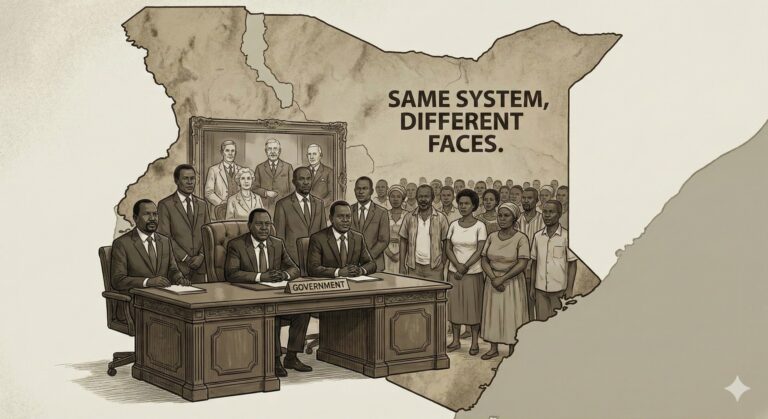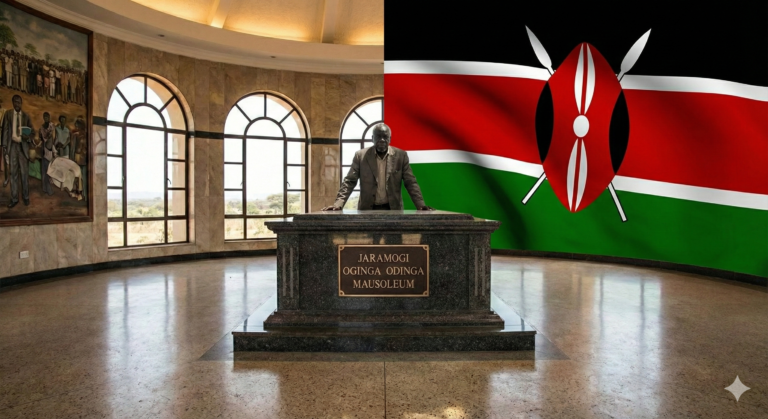
The Mind Behind the Myth
Rigathi Gachagua operates on a different wavelength—he’s not defined by fabric or fashion. His sharp questions, precise arguments, and unwavering principles have set him apart in Kenyan politics. Long before Gachagua became a fixture in the boardroom or State House chambers, his ideas were sparking conversations in hushed circles.
In a political landscape dominated by flashy speeches and empty promises, Rigathi stands as proof that substance still matters. His intellect and decisive stance on national issues have made him a unique force in the Kenyan political scene. In a world of polished rhetoric, he brings a fresh, bold perspective—grounded in reality and focused on delivering tangible results.
The new face in State House wears a suit better than any tailor could craft, but beneath the surface, his actions and decisions are often criticized for lacking true direction. While he may project authority, his administration is accused of failing to deliver meaningful change, with critics pointing to empty promises and a steady decline in national progress.
In Kenya’s power corridors, it’s becoming evident that leadership must be more than just performance. It requires sincerity, vision, and the courage to make tough decisions. Without these qualities, those in power risk becoming mere figureshead, overshadowed by political apathy.
Age, Suits, and National Bleeding
The older political figures who have long dominated Kenya’s leadership, like “R,” may soon fade from the headlines, but their legacy will be felt for generations. Under their stewardship, Kenya’s debt has ballooned, with the country now paying more than 10% in interest on its international bonds—an alarming cost that continues to drain the nation’s resources. Critical projects aimed at improving schools, hospitals, and infrastructure are being stifled by the need to service this debt.
This burden will not just affect the current generation, but future Kenyans, who will inherit a national portfolio primarily weighed down by interest payments rather than tangible assets. The true cost of the past leadership is a chain of debt stretching far into the future—one that will be difficult to break.
With Kenya’s debt-to-GDP ratio lingering above 58%, and projected to fall to below 55% only under strict fiscal discipline, the outlook remains grim. However, enforcing this discipline is challenging in a system where corruption and mismanagement drain public resources while the Kenyan people bear the brunt of these inefficiencies.
Elsewhere in sub-Saharan Africa, governments are cutting budgets and slashing subsidies at the IMF’s urging. Unfortunately, Kenya isn’t exempt. A significant portion of taxpayer funds—one out of every three tax shillings—is funneled into interest payments, leaving critical public sectors like health and education underfunded. As a result, ordinary families tighten their belts, while children attend schools with crumbling infrastructure.
Gachagua’s Stand and Exile
Rigathi Gachagua has been one of the few political figures willing to speak out when most would remain silent. His vocal stance against corruption, tribal manipulation, and unchecked authority has made him a polarizing figure in Kenya’s political landscape. He has consistently warned about the state of the nation’s finances, calling for greater transparency and accountability.
However, Gachagua’s outspokenness led to his impeachment on charges of ethnic incitement, undermining the judiciary, and attempting to subvert the president’s authority. The parliamentary vote to remove him from office was overwhelming—282 to 44—with his impeachment being confirmed in the Senate even as he was hospitalized, reportedly suffering from chest pains.
His departure sent a clear message: truth breeds trouble in a system built on silence. Despite his removal, Gachagua’s accusations of corruption and mismanagement continue to resonate, leaving a trail of questions about the country’s future.
Voices Rising, System Cracking
While half of Kenya’s parliament may be preoccupied with protecting their own interests, voices from the streets are demanding more. Generation Z, in particular, has become an active force in pushing the government to abandon its tax hikes and to reignite a focus on accountability.
In the face of mounting pressure from citizens, analysts suggest that Gachagua’s impeachment is a case of political maneuvering rather than a genuine effort to hold those in power accountable. When accountability becomes selective, public cynicism grows, and the cost of silence becomes painfully apparent in the streets of Kenya.
CLICK HERE:Listen To WANTAMNOTAM PODCAST AND TAKE ACTION




